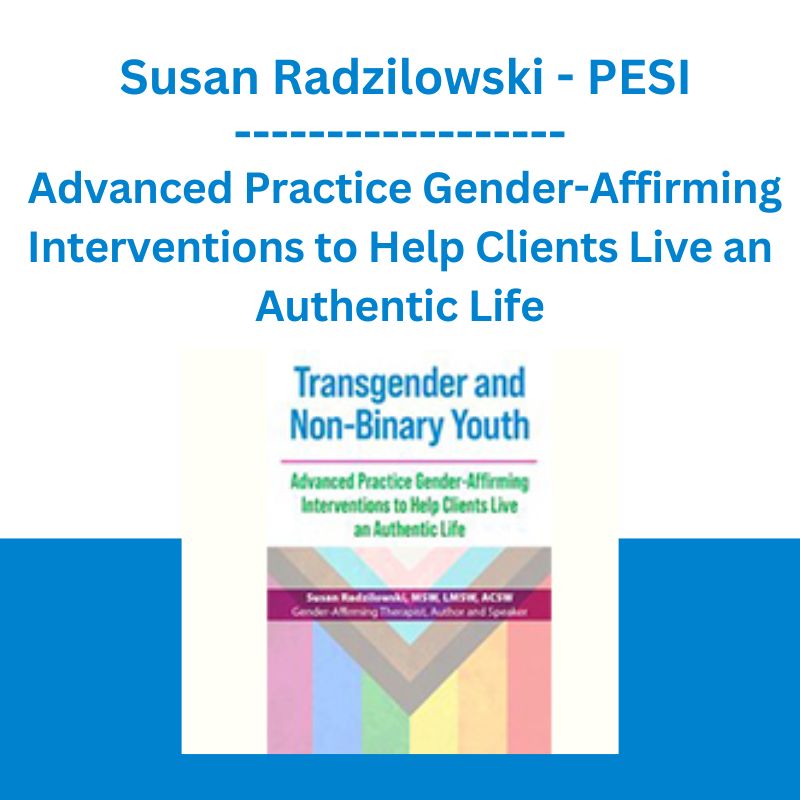*** Proof of Product ***
Exploring the Essential Features of “Transgender and Non-Binary Youth: Advanced Practice Gender-Affirming Interventions to Help Clients Live an Authentic Life – Susan Radzilowski – PESI”
Our transgender and non-binary youth are being hurt by overt discrimination, microaggressions, and health disparities. It’s a heartbreaking reality—society attacks them for just trying to be themselves.
If you’re not already seeing trans and non-binary young clients facing mental health issues, you will. Statistics show this is a growing population, with increasing cases of trauma, shame, fear, depression, and suicidal ideation. Your ability to provide gender-affirming mental health care could be lifesaving.
It’s critical that you’re prepared. An LGBTQ-friendly practice is not the same as one that is LGBTQ-informed. It’s time to become an ally.
This one-day training is your chance to de-pathologize treatment and reduce the vulnerabilities that can lead to significant negative outcomes for kids and teens. Susan Radzilowski, MSW, LMSW, ACSW, is a therapist, advocate, and ally whose decades of experience as a practicing clinician, along with her personal experience as a mother of a transgender child, make her uniquely qualified to teach you about working with trans and non-binary young clients.
From learning safe language, knowing the fine-points of assessment, gaining knowledge about hormones, navigating transitions, managing stigma, and beyond – Susan will cover all the bases so you not only understand these young people, but can truly advocate for them!
Watch this seminar and you’ll learn:
- Tangible ways to create a welcoming clinical space
- Interview strategies and questions for youth and parents
- Essential strategies for support through transitions
- Child-specific gender support plans for all settings
- The most effective guidance and planning recommendations for parents
- How to reconcile parental disagreements related to youth’s transition
It’s time to strengthen your practice with a modern skill set for helping transgender and non-binary youth. Don’t miss your opportunity to transform the lives of young clients, purchase now!
Speaker
Susan Radzilowski, MSW, LMSW, ACSW, has practiced in mental health and educational environments for over 30 years. Susan holds a certificate in Gender Identity and Clinical Concerns. Susan was the founding co-chair of GLSEN SE Michigan and is a past member of the GLSEN National Advisory Committee. She has been a member of the NASW-Michigan Chapter Ethics Committee since 2010. Susan has published several articles on clinical and ethical providing ethical issues of providing social work services to the transgender youth. Susan has a private practice in Michigan and is a part time faculty in the School of Social Work at The University of Michigan and at Wayne State University. She consults and trains on issues related to working with transgender youth for the Michigan Dept. of Health and Human Services, the NASW, Michigan State University, Michigan Medicine, Wayne, The University of Michigan and with local school districts. Susan is the parent of a transgender adult who came out in 2005, at age 15. Her experience as a parent of a trans youth inspired her to shift her professional focus to working with transgender youth and facilities and training professionals to improve access to competent, compassionate care.
Speaker Disclosures:
Financial: Susan Radzilowski maintains a private practice and has employment relationships with Wayne State University and the Michigan Medicine–Child & Adolescent Gender Services Clinic. She receives a speaking honorarium, recording royalties, and consulting fee from PESI, Inc. She has no relevant financial relationships with ineligible organizations.
Non-financial: Susan Radzilowski serves on the NASW Michigan Chapter Ethics Committee (CEC).
Objectives
- Practice essential vocabulary and articulate language that is nonjudgmental and affirming while avoiding hurtful and/or outdated terminology and expressions.
- Analyze and understand increased risk of mental health difficulties including suicidality, negative impact of transphobic comments, and adverse impact of gender dysphoria on daily functioning facing transgender children and adolescents at home, school, and in the community.
- Support the need for protective factors such as supportive family, school environment and community and access to programs to connect with other trans youth to reduce feelings of isolation, access to gender affirming health care.
- Appraise risk factors such as peer rejection, lack of access to gender affirming mental and medical care, being subjected to conversion therapy, rejecting family members, being misgendered, and “dead named” all adversely impact health, educational, and mental health outcomes for transgender young clients.
- Employ safe individual and family counseling to address potentially hurtful, sensitive and/or nuanced behaviors by parents and other adult caregivers to increase support their children in the gender transition process.
- Implement evidence-based strategies to work with parents and families, including helping parents build a Safe Folder to protect against accusations of child abuse with regard to gender transition and how to reconcile parental disagreements related to child’s transition.
Outline
- Beyond Welcoming: Creating Space for Gender Expansiveness
Accurate, affirming language – how, when, and why it’s used
Transphobia – it’s impact on sense of self
Tangible ways to create a welcoming clinical space
How heteronormality has influenced “Gender Dysphoria”
Gender identity versus gender expression - Judgement Free Zone: Clinical Assessment and Screening
Five keys to assessing gender identity
Interview strategies and questions for children and parents
Limitations of DSM-5™ Gender Dysphoria Diagnosis
Transphobia – impact of external and internalized
Increase protective factors to decrease vulnerability
Discern for comorbidities eating disorders, selfharm, suicidality - Essential Strategies for Support Through Transitions
Prepare for transitions – creating support across domains
Unique trajectory of prepubescent clients
Manage social transition at home, school and in the community
Discuss hormone blockers – the importance of psychoeducation for parents
Cross-sex hormones and surgery – informed consent & letter writing
Support name changes and gender markers - Developing Child-Specific Gender Support Plans for All Settings
Evidence-based techniques to alleviate gender dysphoria
Implement a child-specific gender support plan
Tools to reduce dysphoria and improve wellness
Step-by-step suicide assessment with youth
Holistic consultation with a diverse care team
Structing an effective group session - In-depth Collaboration with Parents: Do’s, Don’t, & Nuance
Build rapport with challenging parental qualities or viewpoints
Manage parental grief over child’s transitions
How and when to refer parents for mental health support
Address religious concerns and barriers
Identify harmful and helpful parent behaviors
Provide psychoeducation with ease - Ethical Considerations when Providing Clinical Services
How to reconcile parental disagreements related to child’s transition
Center the child’s voice in the process
Help parents create a “Safe Folder”
Expand and staying within scope of practice
Conversion Therapy – unsafe and unethical aspects
Critically challenging personal biases
Target Audience
- Counselors
- Social Workers
- Psychologists
- Psychotherapists
- School Counselors
- School Social Workers
- School Psychologists
- School Guidance Counselors
- School Administrators
- Educators
- Speech-Language Pathologists
- Occupational Therapists
- Occupational Therapy Assistants
- Case Managers
- Marriage & Family Therapists
- Addiction Counselors
- Nurses
- Other Mental Health and Helping Professionals
- Who Work with Children
Please see the full list of alternative group-buy courses available here: https://lunacourse.com/shop/










 Matthew Kratter - Trader University
Matthew Kratter - Trader University  George Fontanills & Tom Gentile - Optionetics 6 DVD Series Home Study Course (Digital Download)
George Fontanills & Tom Gentile - Optionetics 6 DVD Series Home Study Course (Digital Download)  Sexual Power & Influence + Cure Nice Guy + Give Women Wild Screaming Orgasms - David Shade
Sexual Power & Influence + Cure Nice Guy + Give Women Wild Screaming Orgasms - David Shade